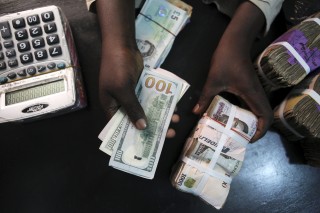Since the global oil price crash in 2014, Nigeria has been one of the hardest-hit economies due to its overdependence on oil as its main source of revenue. China’s economic slowdown, as well as the United States’ rate hike, also affected its economy adversely. As a result, Nigeria’s economic growth has declined dramatically, with its currency falling to an all-time low. Investors are pulling out regularly as most of them are scared to leave their investments in the country, thanks to new monetary policies. The Central Bank of Nigeria put in stringent policies to help save the naira from falling but they backfired.
However, it looks like the story is changing, as the CBN, which once showed that its decisions were not independent of the federal government, seems to be taking a new turn. It is still uncertain if the CBN will be able to sustain some of its recent policies, which are geared towards saving the naira from falling.
Below is the Ventures Africa Weekly Economic Index, for the week ending 24th of February 2017. This economic index gives you a glimpse into the recent activities in Nigeria’s economy as well as changes that could affect the economy:
The Central Bank of Nigeria introduced a new Forex policy

On Monday, 20th February 2017, the Central Bank of Nigeria (CBN) announced a new Forex policy on transactions for Personal Travel Allowance, school fees and medical fees. According to the CBN, this is part of its commitment towards making Forex readily available to commercial banks provided the customer has the necessary document. This announcement led to a change in the naira’s value last week.
How did the naira fare?

The naira appreciated by 14.29 percent from N525/$ to N450/$ at the interbank market due to the new CBN Forex policy. According to reports, this growth represents the highest and fastest gain of 14 percent in the Forex market in over three years. Surprisingly, the huge gap between the parallel and interbank market rate, which widened to N217 before the new policy implementation also reduced to N155 by the end of last week.
What happened with the inflation rate?

According to the data released by the National Bureau of Statistics, the inflation rate of Nigeria continued to rise in January. Consumer Price Index (CPI), which is the measure of headline inflation, rose by 0.17 percentage points from 18.55 percent recorded in December 2016, to 18.72 percent in January 2017. This is the highest inflation rate recorded in 12 years. Food sub-index grew by 0.43 percent to 17.82 percent. This is largely driven by an increase in prices of domestic and imported food items. According to the Centre for the Study of the Economies of Africa (CSEA) report, going forward, strategies that can enhance self-sufficiency in food production remain critical towards dousing the ongoing upward inflation trajectory.
Did the revenue from the sales of crude oil change?

The recent domestic Crude oil statistics released by the Nigerian National Petroleum Corporation (NNPC), revealed an increase in total crude oil export sales in December 2016. The total export sales of crude oil rose by 17.6 percent from $166.18 million in November to $195.40 million in December 2016 representing 17.6 percent. According to the Centre for the Study of the Economies of Africa (CSEA) report, the increase is attributable to a rise in crude oil production following a drastic (Year-on-Year) reduction in pipeline vandalism in the preceding month. Given that improvement in oil revenue is critical to fiscal sustainability and external balance, the government needs to intensify its effort towards ensuring that peace is sustained in the Niger Delta region.
The CBN reintroduced cashless policy nationwide
The Central Bank of Nigeria (CBN) on Thursday announced the re-introduction of cashless policy nationwide whereby Nigerians will be charged for cash deposits and withdrawals. The new charges are expected to take effect from 1st of April 2017. Prior to this announcement, the individual withdrawal rate above N500,000 was three percent and corporate withdrawal rate was five percent.








